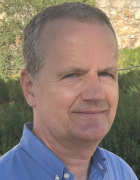
Prof. Dr. Marc Tornow
Academic Career and Research Areas
Prof. Tornow's research area comprises the electronic transport in (bio-) molecular, memristive and superconducting quantum systems. Various methods of thin-film technology, as well as molecular and colloidal self-assembly are employed to realize novel functional electronic systems. Current major focus areas include the study of long-range charge transport in protein structures and the development of neuromorphic electronic devices. In the field of quantum technology, new materials as well as modifications of surfaces and interfaces are being investigated in order to develop strategies for improving the performance of superconducting qubit devices.
After studying physics in Braunschweig and Heidelberg, Prof. Tornow received his doctoral degree from the University of Stuttgart in 1997 with a dissertation at the Max Planck Institute for Solid State Research (Prof. K. v. Klitzing). Subsequently, he worked as a postdoctoral fellow at the Weizmann Institute of Science, Israel (Prof. M. Heiblum), and later on the development of RF devices at Infineon Technologies, Munich. From 2001 to 2006, Prof. Tornow headed an independent BMBF junior research group at the Walter Schottky Institute of the TU Munich (Prof. G. Abstreiter). He acquired his postdoctoral teaching qualification (habilitation) in experimental physics at TUM in 2007. From 2006 to 2013, Prof. Tornow was a university professor at TU Braunschweig, and in March 2013 he was appointed professor of Molecular Electronics at TUM. Since April 2016, Prof. Tornow additionally serves as cooperative department head at the Fraunhofer Institute for Electronic Microsystems and Solid State Technologies (EMFT).
Awards
- Morris Belkin Visiting Professorship, Weizmann Institute of Science, Israel (2025-2026)
- Award winner - BMBF junior research group “nanotechnology” competition (2003)
- Hans-Jensen - fellowship, Minerva Society, Munich (1997)
Key Publications (all publications)
Domenikos Chryssikos, Jerry A. Fereiro, Jonathan Rojas, Sudipta Bera, Defne Tüzün, Evanthia Kounoupioti, Rui N. Pereira, Christian Pfeiffer, Ali Khoshouei, Hendrik Dietz, Mordechai Sheves, David Cahen, Marc Tornow, Mono-Exponential Current Attenuation with Distance Across 16 nm Thick Bacteriorhodopsin Multilayers, Adv. Funct. Mater., 2408110 (2024).
AbstractJulian M. Dlugosch, Henning Seim, Achyut Bora, Takuya Kamiyama, Itai Lieberman, Falk May, Florian Müller-Plathe, Alexei Nefedov, Saurav Prasad, Sebastian Resch, Kai Saller, Christian Seim, Maximilian Speckbacher, Frank Voges, Marc Tornow, and Peer Kirsch, Conductance Switching in Liquid Crystal-Inspired Self-Assembled Monolayer Junctions, ACS Appl. Mater. Interfaces 14, 31044−31053 (2022).
AbstractCattani-Scholz A, Pedone D, Dubey M, Neppl S, Nickel B, Feulner P, Schwartz J, Abstreiter G, Tornow M, Organophosphonate based PNA-functionalization of silicon nanowires for label-free DNA detection, ACS Nano 2, 1653–1660 (2008).
AbstractUlrich Rant, Kenji Arinaga, Shozo Fujita, Naoki Yokoyama, Gerhard Abstreiter, and Marc Tornow, Dynamic Electrical Switching of DNA Layers on a Metal Surface, Nano Letters 4, 2441 (2004).
AbstractM. Tornow, D. Weiss, K. v. Klitzing, K. Eberl, D. J. Bergman, Y. M. Strelniker, Anisotropic Magnetoresistance of a Classical Antidot Array, Phys. Rev. Lett. 77, 147 (1996).
AbstractIf you wish your profile to be changed or updated please contact Franz Langer.